
Signing Their Rights Away By Denise Kiernan & Joseph D’Agnese
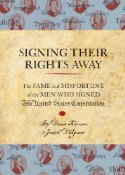 Signing Their Rights Away
Signing Their Rights Away
The Fame and Misfortune of the men who signed the United States Constitution
By Denise Kiernan & Joseph D’Agnese
The authors have written a light-hearted book about the 39 men who signed the Constitution. They manage to be entertaining and informative at the same time, a not inconsiderable feat. A brief introduction provides a “cheat sheet’ of the terms used in the book, and in the back of the book, a “Constitutional Miscellany†that includes, among other items, a few lines about the men who attended the convention but did not sign. All and all a good reference book for anyone curious about those we call the Founders.
For the most part, the signers were ardent believers in the American cause. At least 22 served in the Revolutionary War. Many lost homes, property and loved ones in the conflict.  A few were not stellar characters; two were out and out scoundrels. Demigods, they were not. They were human beings with human foibles.
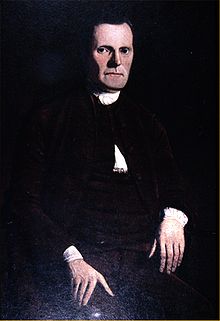 Most were “educated, cosmopolitan gentlemen accustomed to a life of wealth and privilege,†but willing to put it all at risk. What makes this little book so fascinating is that very often the individuals who made the difference between success and failure, were those least likely to do so.
Most were “educated, cosmopolitan gentlemen accustomed to a life of wealth and privilege,†but willing to put it all at risk. What makes this little book so fascinating is that very often the individuals who made the difference between success and failure, were those least likely to do so.
Roger Sherman of Connecticut was such a man. Of humble origins like Hamilton and Franklin, he was by turns, a shoemaker, surveyor, lawyer, bookstore owner and public office holder. He came to the Constitutional Convention believing that giving the legislature power to enforce the laws could repair the Articles of Confederation. He spoke at least 138 times “in a New England accent that was, for many delegates, incomprehensible.â€Â As one delegate described him, “Mr. Sherman exhibits the oddest shaped character I ever remember to have met with. He is awkward, unmeaning, and unaccountably strange in his manner.â€Â However, that same delegate also praised Sherman: “He is an able politician, and extremely artful in accomplishing any particular object; — it is remarked that he seldom fails.â€
When the convention divided over the issue of representation, with large states favoring proportional representation based on population (Virginia plan) and small states wanting one vote per state regardless of size (the New Jersey Plan), it was Roger Sherman who affected the “Great Compromise:†two houses, one in which representation is based on population, the other providing equal representation regardless of size. After the signing, Sherman worked hard for ratification. He is the only Founder to sign all four important documents; The Articles of Association; the Declaration of Independence, the Articles of Confederation, and the Constitution.
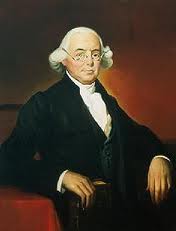 James Wilson of Pennsylvania was an astute colonial lawyer with no head for business. His contributions to the founding of the nation were enormous, but he became an embarrassment to his former colleagues who attempted to forget him and his service to the convention.
James Wilson of Pennsylvania was an astute colonial lawyer with no head for business. His contributions to the founding of the nation were enormous, but he became an embarrassment to his former colleagues who attempted to forget him and his service to the convention.
Not only was he one of the top two convention speakers, (168 recorded remarks) but he put forth the idea that would become the cornerstone of American government; the system of checks and balances. He served on the committee that wrote the Constitution and contributed substantially to its wording.
His downfall was land speculation on borrowed money. Tapped by Washington to be a Supreme Court Justice, he was arrested while still on the bench and served time in debtors’ prison. Sick and broke, when he was released he went into hiding. He died at age 55 a broken man.
The authors describe Gouverneur Morris, a member of the Pennsylvania delegation, as, “A playboy with a gift for both gab and gallivanting.â€Â He had a wooden leg, but that did not inhibit either his personal or public adventures. With the possible exception of Benjamin Franklin, he is the most colorful delegate.
Despite being absent for a month, he made more speeches than any one else at the convention. According to another delegate, his charms were not confined to the ladies. “Mr. Gouveneur Morris … winds through the all the mazes of rhetoric, and throws around him such a glare that he charms, captivates, and leads away the senses of all who hear him… he brings to view things when he is engaged in deep argumentation, that render all the labor of reasoning easy and pleasing…â€
When the prose in a draft of the document needed improvement, the Committee of Style and Arrangement was called upon. Morris was a member of that committee and is credited for writing the much-admired and often quoted Preamble to the Constitution.
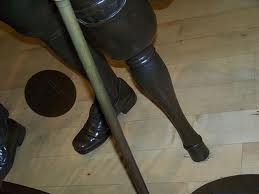 After the signing, Morris traveled in Europe and recorded his romantic encounters in his diaries. At age 57, he married a younger woman of dubious reputation, had a son, and by all accounts, lived happily ever after. Before his death he worked on the Erie Canal and become president of the New York Historical Society. His wooden leg is on display there.
After the signing, Morris traveled in Europe and recorded his romantic encounters in his diaries. At age 57, he married a younger woman of dubious reputation, had a son, and by all accounts, lived happily ever after. Before his death he worked on the Erie Canal and become president of the New York Historical Society. His wooden leg is on display there.
Jacob Broom of Delaware is described by the authors as the invisible delegate. In John Dickenson’s famous portrait of the signing, another delegate blocks Broom’s face from view. Other books about the signers show him in shadow or not at all.
Broom was the son of a blacksmith turned farmer. He was a solid but unremarkable citizen who dabbled in politics. At the convention he did not speak often. However, he spoke when it counted most.
When the battle over representation became most rancorous the convention was at an impasse. There was talk of adjournment sine die, meaning indefinitely. The fear was that if the delegates left, they would not return. That was when the usually quiet Broom spoke with unusual passion. He pleaded that “something must be done by the Convention, although it should be by a bare majority.â€
His plea worked. They adjourned until the next day when they would hammer out a solution. The convention and the Constitution were saved and it was the invisible signer who saved it.
The delegates appear in the book in the order of their signing. Under each name is a line that attempts to sum up the particular circumstance or attribute that distinguished that individual. Each chapter includes biographical information, Revolutionary War activity, contributions to the Constitutional Debates and to ratification, and a “what happened to him afterward†summary. The summary includes burial location (if known) and homes or memorials (if any) available for viewing today.  The latter is a nice addition for history buffs.
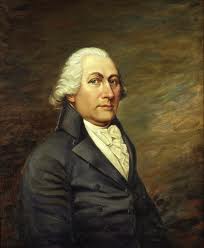 Well-known signers Alexander Hamilton, Benjamin Franklin, and James Madison are among the 39, but the charm of the book is in acquainting readers with the lesser known. Men like first signatory John Langdon of New Hampshire, dubbed “The signer who picked up the tab,†by the authors.
Well-known signers Alexander Hamilton, Benjamin Franklin, and James Madison are among the 39, but the charm of the book is in acquainting readers with the lesser known. Men like first signatory John Langdon of New Hampshire, dubbed “The signer who picked up the tab,†by the authors.
As a wealthy merchant doing business with England, Langdon’s political views clashed with his business interests. He fought in the militia. He paved the way for victory at Saratoga by contributing money and militia to prevent General Burgoyne from working his way down the Hudson.
New Hampshire refused to pay his way to the convention. Whether that was because the state was broke or because of doubts about the wisdom of the effort isn’t clear. Whatever the reason Landon did indeed pick up the tab, not only for himself but also for fellow delegate Nicholas Gilman as well.
At the convention he was a proponent of a strong central government. Afterward he worked hard to win the necessary votes for ratification, not an easy task. He managed to get the vote postponed to give him more time to persuade people to vote in favor. It worked. New Hampshire was the all-important 9th state to ratify, putting the Constitution into effect.
Having read the short biographies and each man’s contribution to the Constitutional debates, this reviewer concluded that no other group at no other time could have done what they did. What amazes is that, exceptional men and scoundrels not withstanding, the real greatness of the Founders was in their totality.
 The posts are coming!
The posts are coming!


6 comments
Since I retweet you, (but alas you don’t retweet me), the author replied thusly to your review:
@WyBlog Thank you for mentioning our book. (Ah, but my coauthor’s name is Kiernan not Kurnan.)
[Reply]
Martin Reply:
September 26th, 2011 at 11:10 am
Thanks for the heads up, Chris. We’re not as tweet savvy as we could be. 🙂
[Reply]
Chris Wysocki Reply:
September 26th, 2011 at 11:28 am
Glad to be of help!
[Reply]
Thank you for this enthusiastic review of our book. The reception this little book has gotten from sites such as yours is truly humbling. Denise and I thank you from the bottom of our hearts. — Joe
[Reply]
May I suggest another edifying book along these same lines, The Politically Incorrect Guide to the Founding Fathers.
[Reply]
Thanks Jeff. Sounds like a good one. We’ll look into it.
[Reply]
Leave a Comment